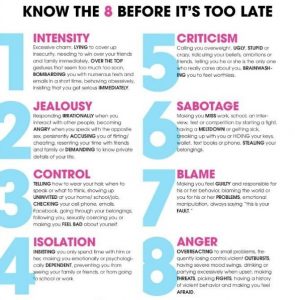Nine Signs You are in an Emotionally Abusive Relationship
Similar to other types of abuse, emotional abusers tend to inflict harm over time. It can be easy to fall for an emotional abuser because, instead of being abusive right away, they will often present their most charming selves, then gradually become more abusive once trust has been built. Psychologist Leanne Donoghue-Tamplin tells The Cheat Sheet this process is referred to as grooming. – Cheat Sheet.

1. You Feel Bad about Yourself.
A loving, supportive relationship should make you feel good about yourself.
2. Your Partner Says Hurtful Things.
People who use words to wound may resort to outright verbal attacks.
3. Your Partner Lies Frequently.
Lying becomes second nature to emotional abusers. Their main concern is getting their way and staying in control.
4. Your Partner Controls the Relationship.
As the relationship progresses, you will feel like you have no say in what goes on (most likely because you do not). Your opinions are ignored or ridiculed. When it is time to make a major decision, you are not included.
5. Your Partner Screams at You.
An emotional abuser may try to assert authority through screaming. This is one of the ways he or she attempts to assume control. Once the relationship gets to this point, you may have become fearful of the abuse escalating.
Barrie Davenport, author of Signs of Emotional Abuse, says many survivors are so overcome by anxiety that they do nothing.
6. You are Criticized Constantly.
Those who verbally mistreat others may have been mistreated during their formative years. If they do not get professional help in timely manner, they often go on to communicate harshly with partners.
7. Your Partner Minimizes the Abusive Behavior.
If you get the courage to point out the bad behavior, your partner may offer excuses or minimize the severity of the behavior.
8. Your Partner is Manipulative.
An emotionally abusive partner will manipulate you in an attempt to get his or her way. You may be pressured to do things you do not want to do. The emotional abuser will try to make you feel guilty or get angry at you for resisting. He or she may also do or say things that cause you to question your perception of reality or your sanity. This is a technique called gas-lighting.
9. You Blame Yourself.
Donoghue-Tamplin says the self-blame is a result of being trained by the abuser to think they are bad or not valuable.
Risk factors for someone being emotionally abusive include: people who have difficulty identifying or communicating their feelings; people who have difficulty taking responsibility for their actions and tend to blame others for their problems; people with personality or mood disorders; people with a manipulative or sociopathic style; untreated victims of abuse; and people with addictions who are not getting help, seeking recovery, or addressing the consequences of their behavior. – Cheat Sheet. http://www.cheatsheet.com/health-fitness/signs-of-an-emotionally-abusive-relationship.html/
What Are Your Choices?
Pray for divine intervention. God wants you to have that which is best for you.
ALE™ Associate, Leave, Educate
Associate with a qualified independent competent mental health professional;
Leave the harmful relationship; or
Educate yourself about the harmful relationship you are in and what you may choose to do about it.
If you choose to stay in your relationship and feel that your issues can be worked out with the help of a mental health professional, one of the first things you will need to do is set boundaries for how you are treated by your partner.
If the behavior continues despite your best efforts, it is time to go.
Qui Tu Es ? Who Are You? Willy William (2016).